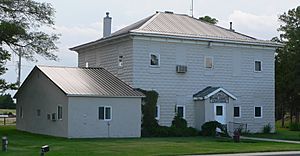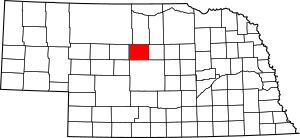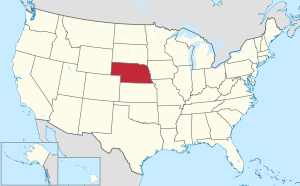Blaine County, Nebraska facts for kids
Quick facts for kids
Blaine County
|
|
|---|---|

Blaine County Courthouse in Brewster
|
|

Location within the U.S. state of Nebraska
|
|
 Nebraska's location within the U.S. |
|
| Country | |
| State | |
| Founded | 1885 (authorized) 1886 (organized) |
| Named for | James G. Blaine |
| Seat | Brewster |
| Largest village | Dunning |
| Area | |
| • Total | 714 sq mi (1,850 km2) |
| • Land | 711 sq mi (1,840 km2) |
| • Water | 3.6 sq mi (9 km2) 0.5%% |
| Population
(2020)
|
|
| • Total | 431 |
| • Density | 0.6036/sq mi (0.2331/km2) |
| Time zone | UTC−6 (Central) |
| • Summer (DST) | UTC−5 (CDT) |
| Congressional district | 3rd |
Blaine County is a county in the state of Nebraska, United States. In 2020, only 431 people lived there. This makes it the second-smallest county in Nebraska by population. It is also the sixth-smallest county in the entire United States. The main town and county seat is Brewster.
Blaine County was officially created in 1885 and started operating in 1886. It is named after James G. Blaine, who was a well-known American politician. When Nebraska set up its license plate system in 1922, Blaine County was given the number 86. This was because it had the 86th-largest number of vehicles registered in the state at that time.
Contents
Geography
Blaine County covers about 715 square miles. Most of this area, about 711 square miles, is land. Only a small part, about 3.6 square miles, is water.
Main Roads
Neighboring Counties
- Loup County – to the east
- Custer County – to the south
- Logan County – to the southwest
- Thomas County – to the west
- Cherry County – to the northwest
- Brown County – to the north
Protected Areas
A part of the Nebraska National Forest is located within Blaine County.
History
Blaine County was created on March 23, 1885. It was named after James G. Blaine, an important American politician. People started settling in Blaine County later than in many other parts of Nebraska. This was because the area, part of the Sandhills region, was harder to reach. People also thought the soil was not as good for farming.
However, things changed in 1904 with the Kinkaid Act. This law allowed settlers to claim 640 acres of land. Before this, they could only claim 160 acres under the Homestead Act. This new law encouraged more people to move to Blaine County.
The first settlements in Blaine County were mainly for ranching. People raised cattle instead of growing crops. The town of Brewster was started in 1884 and became the county seat. Ranching, especially raising cattle, became the main way people made a living. The sandy soil was much better for grazing animals than for growing crops. Settlers learned to live with the environment. Cattle drives and new ways of breeding cattle became very important to the county's economy.
Population Information
| Historical population | |||
|---|---|---|---|
| Census | Pop. | %± | |
| 1890 | 1,146 | — | |
| 1900 | 603 | −47.4% | |
| 1910 | 1,672 | 177.3% | |
| 1920 | 1,778 | 6.3% | |
| 1930 | 1,584 | −10.9% | |
| 1940 | 1,538 | −2.9% | |
| 1950 | 1,203 | −21.8% | |
| 1960 | 1,016 | −15.5% | |
| 1970 | 847 | −16.6% | |
| 1980 | 867 | 2.4% | |
| 1990 | 675 | −22.1% | |
| 2000 | 583 | −13.6% | |
| 2010 | 478 | −18.0% | |
| 2020 | 431 | −9.8% | |
| US Decennial Census 1790-1960 1900-1990 1990-2000 2010 |
|||
In 2000, there were 583 people living in Blaine County. These people lived in 238 households, and 168 of these were families. Most of the people were White (98.97%). A small number were Native American or from two or more races.
About 30% of households had children under 18. Most households (66%) were married couples living together. The average household had 2.45 people. The average family had 2.98 people.
About 26% of the population was under 18 years old. About 17% were 65 years or older. The average age in the county was 40 years.
Communities
Villages
Unincorporated Communities
See also
 In Spanish: Condado de Blaine (Nebraska) para niños
In Spanish: Condado de Blaine (Nebraska) para niños
 | Kyle Baker |
 | Joseph Yoakum |
 | Laura Wheeler Waring |
 | Henry Ossawa Tanner |

